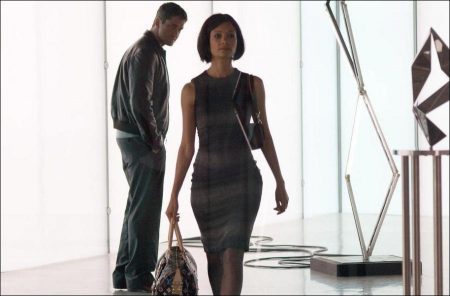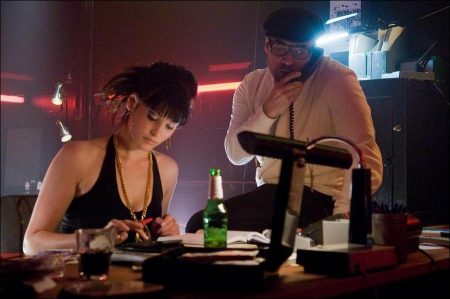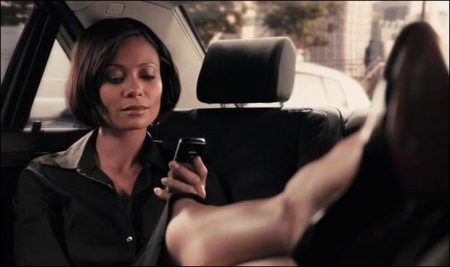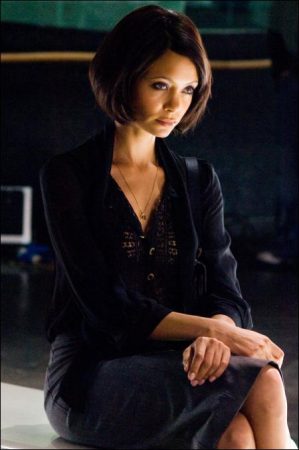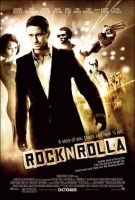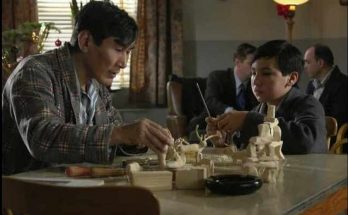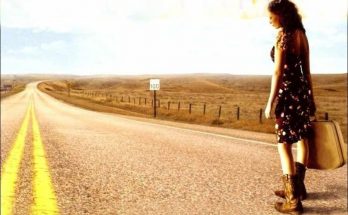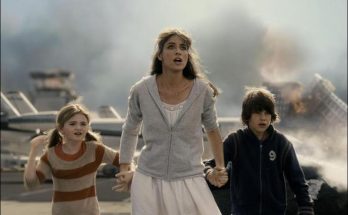Tagline: A story of sex, thugs and rock’n roll.
RocknRolla movie storyline. A dangerous ride into high crime and low life in contemporary London, where real estate has supplanted drugs as the biggest market, and criminals are its most enthusiastic entrepreneurs. But for anyone looking to get in – from small-time crook One Two (Gerard Butler) to shady Russian billionaire Uri Obomavich (Karel Roden) – there’s only one man to see: Lenny Cole (Tom Wilkinson).
A mobster from the old school, Lenny knows the right wheels to grease and has his hand on the throat of any bureaucrat, broker or gangster that matters. With one phone call, Lenny can make the red tape disappear. But as Lenny’s right-hand man Archy (Mark Strong) tells him, London is ground zero for the changing times, with big time mobsters from the East, hungry criminals from the streets, and everyone in between, all vying to change the rules of commerce and crime.
With millions up for grabs, all of London’s criminal underworld conspires, colludes and collides with one another in an effort to take their cut. But as high rollers and petty criminals alike jockey for dominance, the true prize of one multi-million-dollar deal will fall into the hands of a junkie rock star (Toby Kebbell) – Lenny’s stepson, presumed dead but very much alive.
About the Production
Writer / director Guy Ritchie, who previously explored the rougher edges of London in his debut hit, “Lock, Stock and Two Smoking Barrels,” and later in his film “Snatch,” was fascinated by the infusion of big foreign money—mostly from Eastern Bloc countries — pushing its way into London’s old school rackets. “I wanted to take a humorous look at the consequences of the new school pushing in on the territory of the old school,” says Ritchie, who is also a producer on “RocknRolla.” “This film is about trying to get into the property business, which so many people have tried to do, particularly in the last couple of years, because the profits are so vast. Everyone tries to get involved, and of course there are those that end up stepping onto banana skins.”
With new buildings going up almost daily, the city has become an endless construction site and London’s skyline has been altered beyond recognition. “If you go to the top of any tall building, all you can see are cranes,” Ritchie describes. “It looks as though the cranes are breeding. And property prices continue to rocket. It goes without saying that because there’s so much money involved, there are a lot of people taking advantage of the situation.”
Everyone wants in on the action—from the crime kingpin whose days are numbered, to the ambitious Eastern European whose criminal activities are hidden behind a veneer of respectability, to the accountants and bureaucrats counting the money, and, finally, to the small-time cons looking for a shortcut up the ladder of success. “What I’ve tried to do is amalgamate all these disparate journeys and personalities, which connect to one big whole,” Ritchie explains. “Inevitably there are connections, but they go through circuitous pathways from the upper tier to the lower and back again. We wanted to represent different facets of our society who are embroiled in this large-scale scam.”
Producer Joel Silver was immediately drawn to the intertwining elements of humor and action in Ritchie’s edgy tale. “We had always talked about working together on a movie, and within 24 hours of reading it, I knew I wanted to make ‘Rocknrolla,’” Silver recalls. “Guy’s vision is unique and encompasses this dynamic world inhabited by gangsters, rock stars, crooked politicians, Russian war criminals, and everyone in between.”
Producer Susan Downey adds, “‘RocknRolla’ has everything people love about Guy’s movies—the eclectic mix of characters, the interweaving storylines that dovetail in ways you don’t see coming, the fantastic ensemble cast, the energy, the distinct visual style… But it also has an unexpected emotional layer and depth that I think sets this film apart.”
Ritchie, says Silver, has his finger on the pulse of the London criminal underworld where his stories live. “This film offers an affectionate nod to both the old school gangster, Lenny Cole, and to the up-and-coming wise guys in the Wild Bunch. But what they’re encountering with these Eastern businessmen is entirely new. They don’t respect the old school, and they’ve got the money and the muscle to change the way things are done in London. So, the old school will have to adapt to survive. It makes for a very dynamic story and a lot of wild card elements that just send the action into a whole new realm.”
Tired of barely getting by on small-time cons, the Wild Bunch is always looking for the big score. Gerard Butler stars as their de facto leader, a street-smart hustler called One Two, who is looking to play both sides of the fence. Butler had wanted to work with Ritchie since seeing “Lock, Stock and Two Smoking Barrels.” “When I opened the script for ‘RocknRolla,’ it was everything I could have dreamed of,” says the actor. “The film is thought-provoking, but it has also got humor, violence and silliness.”
Ritchie says that the actor possessed all the qualities he envisioned when he created the role of One Two. “Gerry is that intangible mix of charm and danger, of sincerity and guile.” Once on the set, the director praised the actor’s instincts, noting, “Gerry immediately understood what we were doing, which made my work much easier,” he says. “He basically nailed everything on one take.”
One Two and his crew—including Mumbles, played by Idris Elba, and Handsome Bob, played by Tom Hardy—want to break into where the real money is: real estate. “They’re all best mates,” Butler says. “They’ve hung about together for years, been through thick and thin together. Meanwhile, they’re trying to have a bit of a life while they’re doing that. So, that presents its own challenges, including friends that turn out to be not quite as you expected.”
Elba describes the Wild Bunch as “entrepreneurs.” “They’re opportunists that run around London trying to snatch a piece of the old pie,” he says. “Mumbles and One Two complement each other because they are both opportunists. Wherever there is an opportunity to cash in, they snatch it up. In this film, they have a sort of low-life gentlemen’s club, a spieler where they all hang out. That’s where they sit down, have a laugh and decide, ‘What shall we do that’s dodgy today, boys?’ It’s quite a hoot. Guy’s got a very interesting sense of humor.”
But their first attempt at property speculation ends with them losing it all and owing a large sum of money to Lenny Cole, a crooked London businessman who controls both the money and the local real estate market. Lenny, played by Tom Wilkinson, backs the Wild Bunch in a property deal… but only long enough to steal it back from them. “They are just trying to make their way in this world,” says Butler. “They’re trying to break into the property market but haven’t done very well. They get screwed on the biggest deal they ever undertake and think they just got unlucky. And true to the perverse Guy Ritchie humor, that debt comes back to haunt those that screwed them over.”
What’s worse: Handsome Bob has only 24 hours before beginning a five-year stint in the slammer on an unrelated charge. His character harbors a particular secret that comes out as he looks down the barrel of a long sentence. Like the other characters in the film, Tom Hardy says his character is “larger than life.” He continues, “These characters are based in reality, but it’s a sort of heightened reality. Gangsters engage in criminal acts and violence, but these guys are always laughing and goofing off. They have many sides, though, so it’s not such a good idea to underestimate them.”
Where the Wild Bunch are small-timers trying for something better, the position they aspire to is occupied by Lenny Cole, played by multiple Academy Award and BAFTA Award nominee Tom Wilkinson. One of London’s old mob regime who has built up a cozy network of crooked bureaucrats and corrupt politicians to help him out, Lenny is now finding himself out of his depth among the wealthier foreign gangsters, who are rapidly moving in on his territory.
“Guy Ritchie has created a world that sits in a very gray area morally,” says Wilkinson. “It’s not exactly an underworld; it’s somewhere in-between the legitimate world and the criminal world. Lenny Cole is an entrepreneur, a fixer, with substantial criminal connections. He represents the old-fashioned way of getting things done. He doesn’t quite understand that he’s got to move beyond that if he’s going to stay ahead of the competition, who are just as connected and just as ruthless as he is.”
Lenny runs the underworld with rigged odds and no mercy, aided by his righthand man, Archy, who has served him loyally for 20 years. “Lenny and Archy are a direct descendent of the gangsters of the late ’50s, early ’60s,” offers Mark Strong. “They dress smart; they’re presentable. They’re subtle, understated, but menacing. And, when necessary, incredibly violent.”
Into this crucible of London’s underworld comes shady Russian billionaire Uri Obomavich (Karel Roden), who sets his sights on prime London riverfront for a new commercial complex. But to ensure a smooth transaction, he’ll need the planning to go through fast and without any problems. For that, he’ll need Lenny Cole.
Lenny and his gang are “very much a nod back to the old London style of gangster, but that’s exactly what gets them in trouble” says Strong. “Where they come from, it’s about respect and understanding who the top dog is, and they think nobody in their right mind would dream of crossing them. But they come across two separate groups of criminals who don’t have that traditional kind of respect and fear for them: One Two, Mumbles and their crew are a more modern version of criminals. And the Russian element has come into new money, borne of the new capitalism in Eastern Europe, and they can be a much more vicious gang of thugs.”
Ritchie agrees that Uri and his type don’t play by the same rules. “The difference is that with the sheer volume of money coming out of the Eastern Bloc, I think that puts Lenny and his kind out of their depth because all sorts of other characters—possibly more suitably designed for the new world—have usurped their position of authority. They’re just not prepared; they’re just not qualified, basically, to work in this environment anymore.”
Putting another wrench in the works is the Russian’s gorgeous accountant, Stella, who decides to crunch the numbers to her own advantage.
Thandie Newton stars as Stella, the smart and sexy accountant with ties to the underworld. “Stella is extremely good at what she does,” Newton describes, “so good, in fact, that I think she’s getting a little bored and wants to try and mix things up and make things more exciting for herself. And, of course, there’s nothing more exciting for a straitlaced accountant than to get involved in the criminal world.”
Her prowess with money has placed her within the inner circle of Uri Obomavich, the Russian billionaire seeking to invest in London real estate. “Stella captivates Uri in more ways than one,” says Karel Roden, who plays Uri. “She embodies sophistication and he trusts her implicitly with his money, but this trust is perhaps misplaced. In some ways he can easily dominate this new world he’s entering, but clearly not in matters of the heart.”
With Uri’s impending pay-off to Lenny Cole—money intended to smooth the way for a huge mega-complex he wants to build—Stella sees an opportunity to get inside a whole new network of activity…and knows just the man to help her. “One Two becomes her puppet, or so she thinks,” Newton says. “But then she falls for him, which compromises her position.”
Though initially only partners in a high-stakes swindle, One Two and Stella—two people from opposite sides of the tracks—electrify one another. “I really like the dynamic between our characters,” Butler comments. “We share some very funny, offkey scenes. They are definitely sexy, but there is an unusual energy between us and I think that made it different from the typical guy-girl relationship you often get in thrillers.”
For Newton, the collaboration with Butler and Ritchie was one of the film’s most exciting experiences. “Gerry is just a full-on powerhouse; he has an incredible energy,” she says. “He wants to try different ways of doing everything. And no matter what time of the day or night it is, Gerry is always trying to bring something fresh and new to it. It was great because Guy is also so confident in the material and so trusting of us as actors that he gives us the freedom to come up with new ideas and to be spontaneous. To be able to really bring our own ideas to it and make our characters alive, that was getting the best of both worlds. Guy doesn’t just want the surface of a character, he wants there to be real truth to everything and real depth to every character.”
Standing in the way of a deal being made is Uri Obomavich’s lucky painting, which he loans Lenny until their deal comes to a close. When the painting turns up missing, it soon surfaces in the pad of junkie punk rock star Johnny Quid. To find Uri’s painting, Lenny Cole must find Johnny Quid, who, as it turns out, has a family connection to the crossing and double-crossing playing out in London’s underworld: he is the stepson of Lenny Cole.
Ritchie offers, “When Johnny was young, he was probably very talented and went to a very smart school. But he has a gangster as a stepfather, and consequently has spent a lot of time trying to reconcile the polarities of good and evil in his life. He’s asking questions and constantly testing the limits of power, which gets him into trouble.”
Toby Kebbell plays Johnny Quid, the latest sensation in London’s underground music scene, who is currently rumored to be dead. “As a musician and singer, he realizes that to be dead would be much better for his record sales,” Kebbell explains. The collision of Lenny’s interest in finding Johnny, and Johnny’s missing status, cause nothing but trouble for Roman and Mickey, the two Americans who produced Johnny’s last record, played by Jeremy Piven and Chris “Ludacris” Bridges. Lenny puts the heat on Roman and Mickey to locate Johnny… or face the consequences.
“Our characters are the good guys in the film, or at least good in comparison with the other characters,” explains Bridges, who stars as Mickey. “Roman and Mickey went to London to get into the music business, but they got more than they bargained for when they got involved with Johnny Quid.”
Both actors enjoyed working within the unique world Ritchie created in “RocknRolla.” “What I love about the film is that everyone has their own separate stories, but they all weave together by the end,” Bridges comments.
“When I read the script, I just got lost in the world of the characters,” says Piven. “Guy is a lover of language and he made each of the characters incredibly specific. He loves his thugs and they’re not one-dimensional or half-hearted. And as an American, it has given me a real insight into this world. Making the film was very interesting for me. Although he’s very collaborative and willing to hear everyone’s input, Guy has a very clear idea of what he wants; he loves to get the momentum going on the set. It was a very fast shoot, which meant you had to be at the top of your game from the get-go.”
For Guy Ritchie, the action and intrigue of “RocknRolla” is a mirror of the material changes taking place in his home city of London, where glass, steel and concrete have been superimposed over the historic streets and structures, adding a glossy new layer to the city, while not completely blotting out the old. “‘RocknRolla’ is really about the consequences of London becoming an international phenomenon,” he remarks. “London is in the middle of the world in the sense that it’s often the last place you go on your way to America, and it’s the first place you arrive before you get to Europe.”
As Eastern Bloc nations have gained capital and influence in recent decades, the infusion of Russian and Eastern European businessmen into the city’s real estate market has had a dramatic effect on the cityscape. “They have completely changed the rules of business,” Ritchie notes. “If they want something, they don’t haggle the price; they double the price. The competition was completely stumped because how do you deal with that? The rules of engagement have changed. London is evolving constantly, and you can see that in the buildings that are going up. It’s a thriving metropolis now.”
For cinematographer David Higgs, shooting the city as it is today was a key aspect of Ritchie’s vision for the film. “Since Guy made ‘Lock, Stock…’ the East End of London has completely changed,” he says. “It’s now trendy; it’s not grimy and grim any more. It’s much more ritzy and ostentatious.”
But just as London is being reinvented, Ritchie wanted to shoot the city in a way it hadn’t been seen on film, which presented a challenge to his key crew. “It became a question of finding those bits of the city that were brand new and in the process of being rebuilt, and focusing on them,” says production designer Richard Bridgland. “Guy was looking for spaces that had a grand scale to them. So, we looked for locations that had a kind of grandeur and giant open spaces around them.”
“Compared with shooting in most American cities, London is difficult,” adds producer Steve Clark-Hall. “In America, the roads are all parallel and ordered. Here, the roads go every which way and traffic is very difficult to maneuver around London. There were a lot of logistical challenges, but the plus side is the city itself: the buildings, the images, the interesting architectural shapes that you get in London.”
With the city featuring so prominently in the story, the filmmakers had to not only negotiate London’s tricky infrastructure but also use every resource at hand to gain permission to shoot in some of the city’s most iconic landmarks. Those landmarks include the imposing Battersea Power Station, built in the 1930s by Sir Giles Gilbert Scott and soon to be redeveloped; the Fruit and Wool Exchange in the City of London, which looks out over the Swiss Re Tower (the so-called Gherkin) and the Nat West Tower; West India Dock Pier, sandwiched between the Millennium Dome and Canary Wharf, with its sleek, ultra-modern high-rise office complexes; and the 1960s modernism of the Barbican Centre.
“Guy was very insistent on representing a very specific London that is new and changing and being modernized rather than the old, Victorian image of the city we see so often in films,” says location manager Claire Tovey. “We achieved a nice mix between the ultra-modern of Wembley and the Gherkin and that sense of change and constant evolution you see in the Battersea Power Station redevelopment.”
For the place where Russian investor Uri does business with Lenny Cole, Ritchie and his team found the right space in the stunning new Wembley Stadium with its highly visible arch. “You couldn’t imagine Uri having a small office in a regular office building or anything,” explains Bridgland. “So we went straight to Wembley Arena and put in his office overlooking the field. You could just imagine a property magnate like him owning a perch like that. Wembley was one of the places that we were particularly excited about filming in because it has these big, grand spaces and a wonderful cinematic quality.”
“Wembley was quite a coup,” adds Tovey, “because we were the first film crew to use it. It required a lot of persistence to secure it, but I think they just got sick of us in the end and relented,” she laughs.
Battersea Power Station is a structure made world famous by its appearance on an album cover by the band Pink Floyd. Bridgland and his team were able to convert some of the cavernous interior spaces into various sets for the production, including the spieler, the haunt of the Wild Bunch. The production designer did a little underground research of his own to create the space. “We had to surreptitiously find out what they looked like. It’s a private place for them, away from the police, so we tried to recreate that atmosphere.”
Battersea Power Station also provided a vast old turbine hall, filled with old machinery, where Lenny Cole takes informants to find out what they know. “Battersea gave us some real scale, and the turbine hall was just a wonderful location,” Bridgland says. “It was 3 or 4 stories high, filled with all sorts of old, rustic metal, and it was just an amazing place to film.”
Another key location was Middlesex Hospital. “Middlesex Hospital is quite a London landmark,” Bridgland describes. “It has been there for a hundred years and has been derelict for a few years now, so we took over quite a few rooms in there and changed them around. We had half a dozen locations in that place. We just used various rooms and spaces and then decorated them to suit what we needed.”
Bridgland and his crew transformed the interior of the old hospital into a crack house, a library space, and even Lenny Cole’s posh office. “We created the crack house location, which looked like this old, diseased building, and then, with a few partitions put up the library,” he recalls. “And then a week later, the unit all turned up again and we turned it into Lenny’s office at his home, which is a smartly paneled house full of equestrian paintings and all this fine furniture.”
For Uri’s yacht and the Councillor’s office, it was crucial to find backdrops that were new and modern. Canary Wharf provided the ideal setting for Uri’s yacht and the Barbican Centre housed the Councillor’s office. “Since Guy’s vision is to show the London you haven’t seen before, we wanted to update the image of the local authorities in London, and the Barbican Centre is such a spectacular building, built in the ’60s,” Bridgland enthuses. “It’s got this real ‘Dr. No’ quality about it, with all the lights in the ceiling and everything. It has a fantastic look and we had to do very little to it. We changed the signage, but basically just dressed it as an office, and it turned out great.”
Gerard Butler, who lived in London for years, was delighted to not only return to the city but also get a taste of Guy Ritchie’s particular take on the city. “I was quite excited to come back and do a movie in London, especially with Guy, who is seen by many as the ultimate authority on modern London and its culture and humor,” he says. “Guy has a great visual style for mixing the modern and the ancient, putting it all together, and filling it up with character.”
One of the standout features of Guy Ritchie’s films is the style in which they are shot. Partly because of the large ensemble cast and partly to keep the production as efficient as possible, “RocknRolla” had a rapid six-week filming schedule. Using HD cameras throughout made it that much easier and efficient.
“Guy works fast,” comments Steve Clark-Hall. “Guy likes to create energy on the set and keep that energy going. That he managed to do that without creating tension during such a fast shoot is a testament to his great skill as a director.”
Mark Strong, who previously collaborated with Ritchie on “Revolver,” was well aware of the director’s working methods. “He creates an environment that is fun and inventive, and he makes you want to get it right,” he says. “We did a scene in the middle of Cambridge Circus, a busy intersection in Soho, and the cameramen were hidden in a little workman’s tent on the other side of the street. We just played the scene with the public walking up and down the road. It was chaos. But that kind of filmmaking is great fun to do because it keeps you sharp; you get in, you shoot the scene, you get out. You haven’t too long to think about it, and that is often the best way.”
One of Butler’s most memorable scenes was an epic chase through neighborhood backyards, train tracks and warehouses in which One Two and Mumbles are being pursued by two Russian thugs. “It’s an incredibly long and tense action sequence, but it’s also very funny because the guys chasing us cannot be stopped,” Butler says with a laugh. “We shoot them, we hit them, we club them, we crash our cars into them, and they just keep coming. The scene really speaks to Guy’s incredible aesthetic and energy. It’s one of the most unique chase scenes I’ve ever seen, or certainly that I’ve been a part of.”
Silver concludes, “Guy has made a movie that defies the boundaries of a straight-up action comedy or crime caper. It’s a lot of fun but there’s a fable in the midst of all the action. One of the characters compares life in this world to a cigarette box, which has a regal sophisticated appearance on one side, but on the other it tells you in no uncertain terms that it will kill you. In always looking for a shortcut to the good life, these characters are living on the knife’s edge of life and death. That’s ‘RocknRolla.’”
RocknRolla (2008)
Directed by: Guy Ritchie
Starring: Gerard Butler, Thandie Newton, Gemma Arterton, Chris “Ludacris” Bridges, Jeremy Piven, Idris Elba, Tom Wilkinson, Tom Hardy, Karel Roden, Toby Kebbell, Dragan Micanovic
Screenplay by: Guy Ritchie
Production Design by: Richard Bridgland
Cinematography by: David Higgs
Film Editing by: James Herbert
Costume Design by: Suzie Harman
Set Decoration by: Debbie Moles
Art Direction by: Andy Nicholson
Music by: Steve Isles
MPAA Rating: R for pervasive language, violence, drug use and brief sexuality.
Distributed by: Dark Castle Entertainment
Release Date: October 31, 2008
Views: 60
